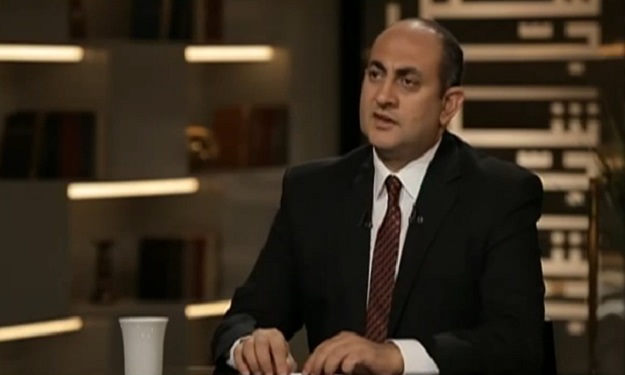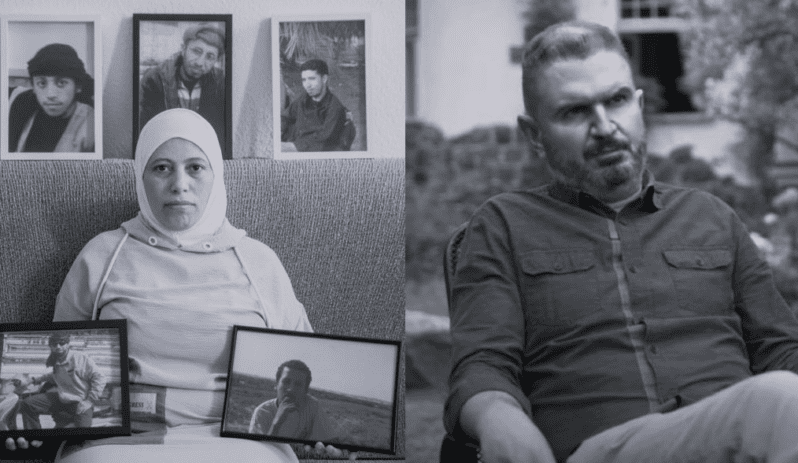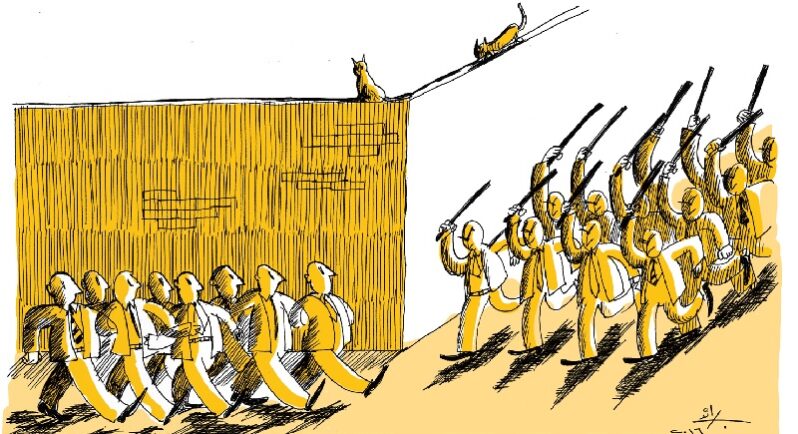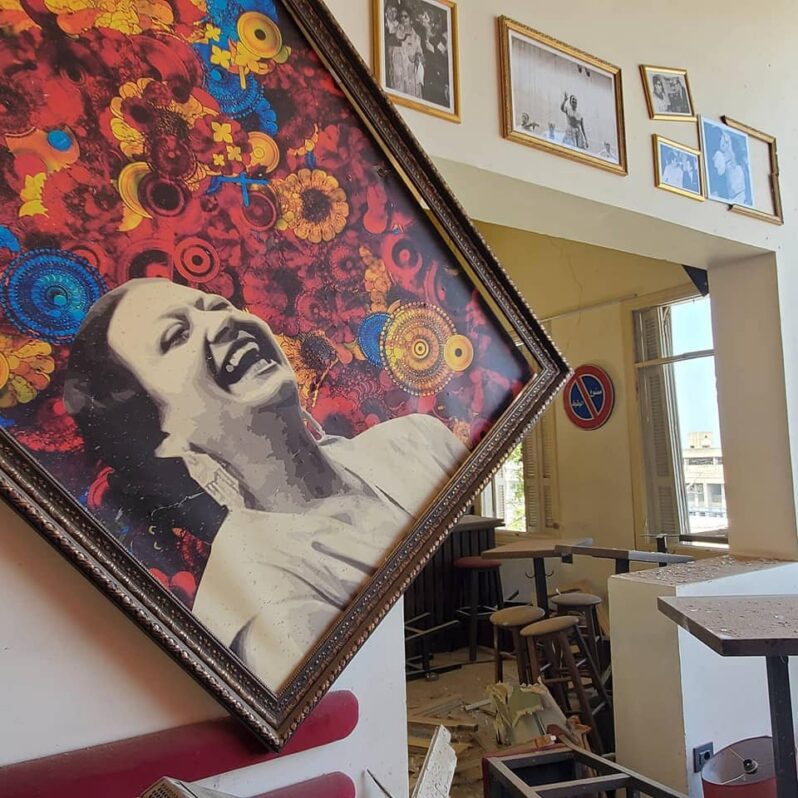Defending Tiran and Sanafir: Khalid Ali Remembers (I)

Multiple emotions are evoked as I write these words. We have achieved a historical victory. We obtained seven final and decisive rulings from the Court of Administrative Justice and the Supreme Administrative Court. The courts have affirmed that the islands of Tiran and Sanafir are Egyptian, annulled the agreement ceding them, rejected all appeals by the government, and decreed the continued execution of these rulings. In this testimony, I will try to recall some of the key stages in this case and their significance.
Reacting to Bad News
I learned of the agreement’s signing on the afternoon of April 9, 2016. At the time, I was in the city of Qena attending a penal hearing in the trial of officers and policemen of the Luxor department, who had caused the death of citizen Talat Shabib. I was the attorney representing his family heartbroken over its loss. The court decided to continue the hearing the following day, so I stayed in Luxor. As soon as I heard that sinister news, all paths led to rejecting this “agreement” and preventing its finalization via all means and devices. Of course, the first step was to announce my rejection of the agreement. The second decision was to file a court case against it, whatever the risks and challenges. I decided that the case should be in my name and bear my firm’s logo so that I would bear all moral, professional, and political responsibility for it. Throughout that night, I liaised online with my colleagues in the Egyptian Center for Economic and Social Rights (ECESR) to draft and prepare the notice of appeal, which was filed the following morning (April 10, 2016). The media reported that we had filed the case, and thereafter calls kept coming from all corners of Egypt expressing their desire to assist, support, and participate in the case.
Publicising the Case
The desire out there to assist and support the case far exceeded my every expectation. Only then did I sense the extent of the popular opposition to this agreement. My colleagues in the ECESR and I had to be aware of the real challenges of this case. The problem was not just the legal challenges that we face with every case, such as preparing the team to work on it, gathering documents, and preparing briefs and pleadings. The real challenge was how to manage this case socially, politically, and professionally. We were facing a unique and exceptional dispute, the likes of which no state or court in the world had witnessed: the people were filing a court case against the president and his government for ceding territory from our country to a sister state, and there are many ties between the two fraternal peoples. Whether we liked it or not, this dispute transcended not only the courtroom but also domestic and regional borders, for the case’s outcomes would have an international impact.
Hence, this case was not merely a personal case of a lawyer, law firm, or rights center, but a case connected to the fate of a nation and the pride of a people in every political, social, economic, and constitutional sense of the words. The winner or loser of the case would be Egypt. Hence, the first message I posted on my Facebook page (on April 10, 2016) read:
“I have filed a court case against the cession of the islands, and this is not a personal case. Hence:
-
The case is open to any citizen who wants to join it via their own lawyer or by contacting me or my lawyer colleagues (Dr. Yussuf Awad, Mohamed Adel Soliman, Malek Adly, Ziad al-Eleimy).
-
The case requires great research and legal effort on the historical, geographical, international, strategic, and constitutional levels. Hence, we call upon anyone who can provide research assistance in this case to share their knowledge, or whatever documents they possess.”
On April 11, 2016, I published the second message, wherein I wrote:
“The Court of Administrative Justice has set the hearing on May 17, 2016, to examine the case of the islands in the First Circuit Individuals (Rights and Freedoms). Tomorrow (Tuesday), there will be a meeting for all lawyer colleagues wishing to work on the case at 7:30pm in my office at [the office’s address]. We will hold a meeting for all researcher colleagues wishing to work on the case next week; we shall announce the time and place after dividing the legal tasks among the lawyer colleagues. Welcome to all those with the capacity and earnestness to participate in this action.”
The Defense Team
In the meeting on the case held in my office and the discussion with those wanting to volunteer and join it, we agreed that a number of our colleagues would file some new cases. In fact, eleven new cases were filed by our colleagues and other lawyers and citizens, aside from the case filed by lawyer Ali Ayoub and the one under my name. In the hearing on May 17, 2016, the court decided to merge the two cases, and one ruling was issued on both.
As for the eleven other cases, they are still pending before the administrative judiciary. In the first hearing, the court decided to refer them all to the Board of State Commissioners. The cases remain with the board to this day, for it has not finished its report providing its opinion on them. These cases include approximately 250 citizens.
I included some of the revolutionary youth who were imprisoned at the time and had asked to join me as parties to the case. They were Alaa Abd El-Fattah, Ahmed Maher, Malek Adly, Ahmed Douma, and Amro Ali. Additionally, 177 citizens gave me their powers of attorney in order to join the case.
The Court of Administrative Justice listened to the arguments that Ali Ayoub and I delivered and to our defense briefs. It viewed and accepted our portfolios of documents. On June 21, 2016, it issued its historical ruling on the case.
Opposing Litigation: Bad Means for a Good End?
While most political forces that rejected the agreement and maintained that the islands are Egyptian welcomed the case to annul it and expressed their desire to support, assist, and participate in it, some did disapprove. The opposition was divided in two over its reasons for rejecting the case.
The first group thought that this kind of subject is not fit for litigation and that any court case over it would actually aid and do a service for the regime, as it would transfer the struggle and anger against the agreement from the street to the courts, just as the regime wanted.
The second group’s objection was based on the possibility of a ruling against the case being issued. It claimed that with this case, we had gone to the regime to play in its court via the political and legal mechanisms that it controls; the case would thus grant the agreement new legitimacy, and be grounds for the conviction and imprisonment of all the youth that had been arrested in the protests against the agreement.
Although I disagreed fundamentally with these reasons for opposing the case, they did bear some political and legal validity and cast upon us a burden and national, moral, political, and professional responsibility if we lost the case.
Gathering Documents: A Broad Collective Effort
The day the case was filed, we had a few documents. Some of them drew on publicly available political, legal, and international material, some of which were circulated by citizens on social media. We depended on a bit of this and that the day we wrote the case’s opening statement. But it was in no way enough to convince the court that the islands are Egyptian, or help it issue a ruling annulling the agreement. Hence, I posted on my social media page that we needed documents relating to the islands, the conflict in the Red Sea, or the Arab-Israeli conflict. We requested some documents and sources by name. At the same time, many Egyptian researchers, such as Dr. Khaled Fahmy, Dr. Taqadum al-Khatib, and Dr. Mamdouh El Karamany, took the initiative to prepare studies and documents on the islands and publish them online.
The youth also ran online campaigns to gather documents, and some newspapers and press websites helped republish all the documents, and raise awareness that the islands are Egyptian. Hundreds of citizens took the initiative to gather all these documents and send them to us. We also drew on the historical atlases and maps of the Egyptian territory since 1906, maps of the colonial campaigns in the Middle East region, and all doctoral theses, books, and studies that have addressed Sinai or the islands, either in Arabic or English. Egyptians overseas also played a large role in searching in international libraries and universities, UN records, and the British National Archives. They sent the Historical Atlas of the Kingdom of Saudi Arabia, which was published in 2000 by King Abdulaziz Foundation for Research and Archives, whose board was at the time chaired by then-prince and current king of Saudi Arabia, Salman bin Abdulaziz. This atlas covers the various historical stages of the kingdom’s establishment until its rise in its current form in 1932, as well as the subsequent periods until the atlas’ publication in 2000. The atlas contains more than 200 maps, none of which included the islands. Additionally, according to the atlas’ index, Saudi Arabia’s only islands in the Red Sea are the Farasan Islands. Neither Tiran nor Sanafir appear in it.
The volume of documents that the Egyptians produced was enormous and proved that the islands have been Egyptian territory since decades before Saudi Arabia’s establishment. Egyptians worked diligently to copy all these documents at their own expense, and send them to us at the ECESRs headquarters in Cairo to make sure that each one reached me personally, and to explain their contents in order to support us in our pleadings and in preparing our defense. Every document connected us to new documents until the complete picture became clear to the court. “A historical epic” are the only words I can find to describe how Egyptians collected these documents and made sure that they reached the court.
Arresting Malek Adly and ECESR Employees
Once the case was filed and before its first hearing, the waves of threats, pressure, and direct and indirect coercion against those working in the ECESR (a center where I work as a legal advisor and that is currently run by Malek Adly) began. This pressure continues to be exerted to this day. All the center’s offices served as collection points for signatures and case documents, and it hosted meetings for the defense team and researchers for writing the briefs and pleadings and preparing the documents. Of course, none of this occurred far from the eyes of the security and intelligence forces, who were making daily reports on the center’s activity. The case was filed on April 10, 2016, and the court scheduled the case’s first hearing on May 17, 2016.
The first of these pressures came on April 19, 2016, when an arrest warrant for Malek Adly was issued on the allegation that he had organized protests in Qalyubia, even though it is the one governorate that had not seen any protests except those by lawyers at the al-Khankah court (Malek was not among them). He was then arrested on May 5, 2016, beaten, and accused of being drunk. As we were waiting for the investigation of Malek to begin, we were surprised to find the media falsely claiming that at the time of arrest, he was in a state of obvious intoxication, even though when he was interviewed in the Public Prosecution Office until the early hours of dawn, he was able to respond to every question in formal, literary Arabic. The Public Prosecution did not note any signs validating that allegation, and had it actually been true, the Public Prosecution should have stopped interrogating him until he sobered up. Malek was then remanded in solitary confinement for more than 120 days. He was only released on August 28, 2016, after the Court of Administrative Justice had issued its ruling annulling the agreement on June 21, 2016.
Moreover, many researchers were arrested, and Homeland Security summoned a number of those working in the ECESR to discuss the center and their activity in it. There were also phone calls and threatening messages sent by the web brigades. Media campaigns constantly accused us of treachery, collaboration, destroying the pillars of the state, and so forth.



